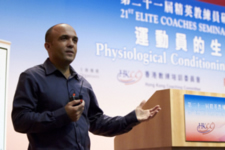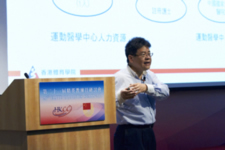 |
Elite Coaches Seminar: Insights into the Physiological Conditioning of Elite Athletes  The 21st Elite Coaches Seminar, held on 7 December 2013 at the HKSI, gave local and Mainland coaching professionals an opportunity to learn from and exchange ideas with sports science experts on the topic of physiological conditioning. This year’s seminar, entitled ‘Physiological Conditioning of Elite Athletes’, attracted about 300 coaches from Hong Kong and the Mainland. The 21st Elite Coaches Seminar, held on 7 December 2013 at the HKSI, gave local and Mainland coaching professionals an opportunity to learn from and exchange ideas with sports science experts on the topic of physiological conditioning. This year’s seminar, entitled ‘Physiological Conditioning of Elite Athletes’, attracted about 300 coaches from Hong Kong and the Mainland.
This annual event is one of the most important on the HKSI’s calendar of special training opportunities for coaches of elite athletes. It also provides an excellent platform for world-class expertise both locally and in the Mainland to share their experience and keep abreast of the latest development in various coaching aspects. The seminar is jointly organised each year by the HKCC and the All-China Sports Federation.
The opening ceremony was officiated by Professor Frank Fu MH JP, chairman of the HKCC, Mr Li Weibo, vice general director of the Science and Education Department of the General Administration of Sport of China (GASC), Ms Zhang Xia, deputy director of the Education Division of the Science and Education Department of the GASC, and Mr Sun Wenxin, general manager of the Training Department of the GASC.
The speakers at the seminar included Mr Zhou Rui, coach and former member of the China fencing team, Dr Anthony Giorgi, head coach of athletics at the HKSI, Dr Chen Xiaoping, Associate Dean of Physical Education at Ningbo University, and Mr Xu Zhengzheng, Chinese medicine coordinator at the HKSI.
 Mr Zhou, who coached the Jiangsu women’s foil team in the 2008 National Championships, where they won the team and individual events, spoke on the topic of preparing athletes physically for major competitions. He said the time required for physical preparation varied from 19 days to 70 days, depending on the sport, level of training, physical condition and ability of the athlete, and pointed out that coaches should have a solid understanding of the relevant information in order to design a training strategy that was suitable for each athlete. Mr Zhou, who coached the Jiangsu women’s foil team in the 2008 National Championships, where they won the team and individual events, spoke on the topic of preparing athletes physically for major competitions. He said the time required for physical preparation varied from 19 days to 70 days, depending on the sport, level of training, physical condition and ability of the athlete, and pointed out that coaches should have a solid understanding of the relevant information in order to design a training strategy that was suitable for each athlete.
 In his talk on developing a periodisation training programme for the Olympics, Dr Giorgi shared his personal experience in helping over 50 Australian athletes in various sports, including world record holders and Olympic medalists, prepare for the last three Olympics. He stressed that coaches, athletes and support teams should have a clear vision of each athlete’s performance expectations, physical requirements, current strengths and weaknesses, and physical target before they can develop a well-planned physical training strategy. At the end of the presentation, he encouraged the coaches to listen to the athletes along their journey and respond with clarity. In his talk on developing a periodisation training programme for the Olympics, Dr Giorgi shared his personal experience in helping over 50 Australian athletes in various sports, including world record holders and Olympic medalists, prepare for the last three Olympics. He stressed that coaches, athletes and support teams should have a clear vision of each athlete’s performance expectations, physical requirements, current strengths and weaknesses, and physical target before they can develop a well-planned physical training strategy. At the end of the presentation, he encouraged the coaches to listen to the athletes along their journey and respond with clarity.
 Dr Chen, in his talk about training and conditioning before major competitions, commented that in order to enhance the effectiveness of training before major competitions, it was not recommended to incorporate new and unfamiliar skills into the training programme during the pre-competition training. Instead, he said it was essential to closely monitor the athletes’ nutrition levels and recovery progress to avoid a deteriorating physical condition, and provide a relaxed, positive training environment. Dr Chen, in his talk about training and conditioning before major competitions, commented that in order to enhance the effectiveness of training before major competitions, it was not recommended to incorporate new and unfamiliar skills into the training programme during the pre-competition training. Instead, he said it was essential to closely monitor the athletes’ nutrition levels and recovery progress to avoid a deteriorating physical condition, and provide a relaxed, positive training environment.
 Mr Xu, who is an expert in sports and manual therapy, is often invited to assist Hong Kong teams at major sports events, where he shows athletes effective ways to eliminate fatigue and prevent injuries, and provides manual therapy to injured athletes. He spoke on the use of Chinese medicine and manual therapy in sports, explaining that pressure, frequency and the direction of hand gestures were key elements in manual therapy. If applied correctly, he said, injured athletes should benefit hugely from the therapy, resulting in tendon relaxation, improved blood circulations and reduced swelling. Mr Xu, who is an expert in sports and manual therapy, is often invited to assist Hong Kong teams at major sports events, where he shows athletes effective ways to eliminate fatigue and prevent injuries, and provides manual therapy to injured athletes. He spoke on the use of Chinese medicine and manual therapy in sports, explaining that pressure, frequency and the direction of hand gestures were key elements in manual therapy. If applied correctly, he said, injured athletes should benefit hugely from the therapy, resulting in tendon relaxation, improved blood circulations and reduced swelling.
|
 |